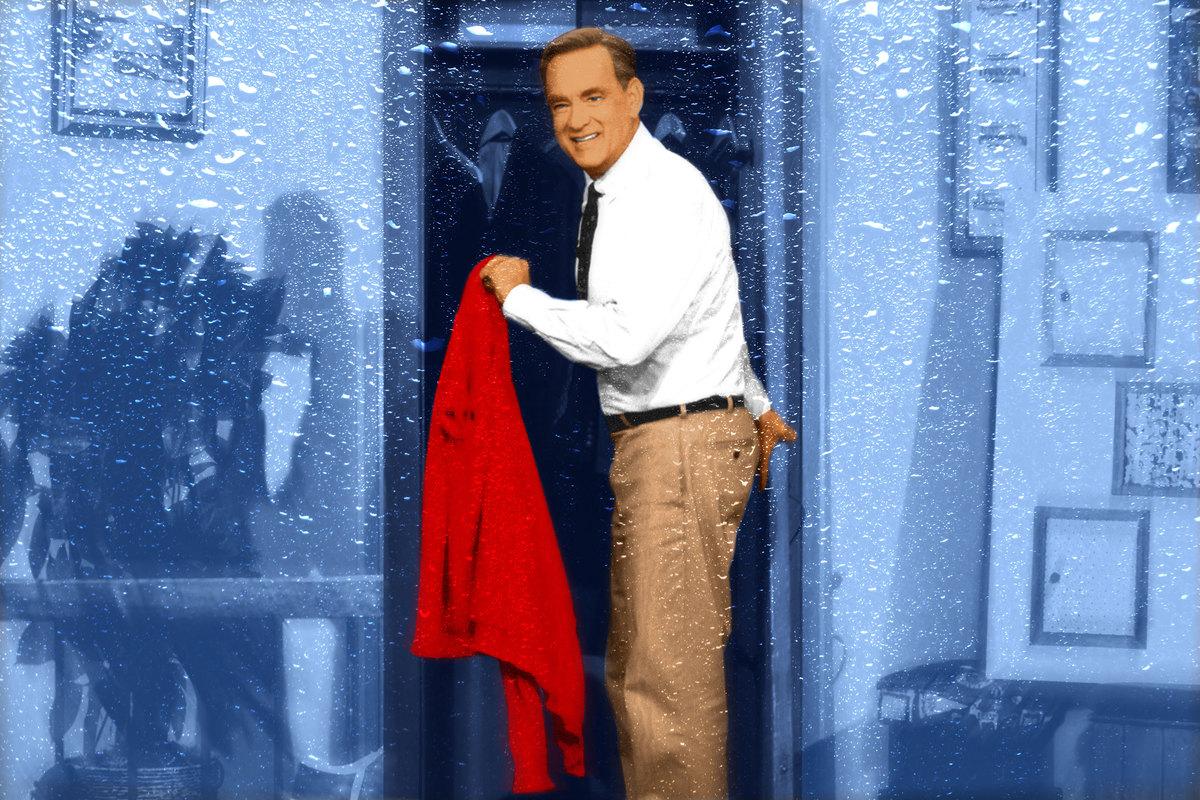

It’s hard to think of a more wholesome activity to do during the Thanksgiving holiday than watch A Beautiful Day in the Neighborhood, a film about one of television’s most wholesome personalities, the late Fred Rogers, as portrayed by one of Hollywood’s most wholesome actors, Tom Hanks. And yet, you may have some understandable apprehension about seeing the movie in theaters—especially if you’re someone who isn’t exactly keen on crying in public.
There’s just something about the unwavering, saint-like kindness of Mr. Rogers that, under the right circumstances, is liable to turn you into an emotional wreck. I tried my best to hold it together during a screening of last year’s excellent documentary Won’t You Be My Neighbor?—and I was doing a pretty good job until they got to Mr. Rogers meeting Koko the gorilla, who proceeded to hug him and noticeably respond to his love and empathy. (Anything involving animals and I’m a goner.) My resolve broke; face covered in tears and snot, a sadistic publicist then had the audacity to be like “Hey, so what’d you think?!” as I left the screening looking like I’d just had to bury my entire family. (Full disclosure: After wrapping up this paragraph I decided to rewatch the documentary’s final scene and am now crying quite a bit, but I’m taking some solace that it’s happening in the comfort of my home.)
So, yeah, crying in public sucks! But this also presented a dilemma because I really wanted to see A Beautiful Day in the Neighborhood, especially once the glowing reviews started rolling in. And that’s why I ended up going, though not without bringing some reinforcements (a box of tissues in my backpack). How much could the film bring you to tears? Well, I’ve assembled this A Beautiful Day in the Neighborhood Sadness FAQ to anticipate some questions you may have while revealing as few spoilers as possible.
Will A Beautiful Day in the Neighborhood make you cry?
I cannot provide a definitive answer because everybody handles their emotions differently, but I can say that it most certainly made me cry. Though, compared to last year’s Mr. Rogers doc, I was less of a visible mess for this one.
There are stages of movie-watching sadness, and this didn’t reach my top tier—reserved for Marley & Me, Manchester by the Sea, My Girl, Titanic (don’t judge!), and when Will Smith had to kill his dog in I Am Legend.
But it’s a sad movie, then?
Well, it’s complicated. There are definitely moments that are sad, but the movie avoids being annoyingly maudlin. The setup—in which cynical journalist Lloyd Vogel is tasked with doing a puff piece on Mr. Rogers—is framed like an adult-oriented episode of Mister Rogers’ Neighborhood. (It even opens with Hanks-as-Rogers greeting you in a startlingly accurate recreation of the show’s opening.) Vogel has bottled up his childhood trauma—his mother died of cancer and his dad slept around while that was happening—and through his conversations with Mr. Rogers, he slowly learns how to navigate his repressed emotions and prepare for fatherhood himself. But it’s a process.
In the trailers, Vogel looks very sad.
That’s because Matthew Rhys is like the Daniel Day-Lewis of being sad. But I actually had a more physical reaction (a.k.a. my tears) to Mr. Roger’s inherent kindness and the way Vogel and other characters in the film responded to it. I had a single tear roll down my face in a scene—shown in the trailer, so I don’t think this constitutes a major spoiler—when Vogel and Mr. Rogers ride the subway in New York, and the whole train car begins singing the Mister Rogers’ Neighborhood theme song. It brought back a wave of nostalgia from watching the show when I was a kid, and reinforced the unique way Mr. Rogers had a universal appeal to people of so many different ages and backgrounds who watched him on screen.
Sure, it’s a little melodramatic to say, “Mr. Rogers felt like a third parent for me growing up,” but that doesn’t make it any less true. (Sorry, I might be crying again.)
Well, that subway scene does sound very sweet. Are any of the events in the movie actually true?
Vogel is loosely based on real-life journalist Tom Junod, who was assigned a short Mr. Rogers profile when he worked at Esquire in the late ’90s. And like Vogel, Junod eventually turned it into a cover story—both of which have the same headline, “Can You Say … Hero?”
Junod also talks about his father in the piece—though Junod’s relationship with his dad isn’t the same as Vogel’s. (At the beginning of the film, Vogel punches his dad during his sister’s wedding.) The aforementioned subway scene, however, is plucked straight from the actual Esquire piece and did, as Junod writes, turn “the clattering train into a single soft, runaway choir.”
So Mr. Rogers have a similar effect on Junod?
Yes. Junod has said—and the Esquire feature pretty much underlines—that meeting Mr. Rogers changed his life.
Wow. Well, back to the movie. Does Mr. Rogers do anything else that might turn on the waterworks?
There’s a scene when Mr. Rogers and Vogel are grabbing food, and Mr. Rogers asks him to take a minute and silently reflect on the people whose love has helped him get to where he is today. As that happens, the rest of the patrons in the restaurant—including a brief cameo from Mr. Rogers’s actual wife, Joanne—fall silent, too. And then Mr. Rogers breaks the fourth wall and stares right into the camera, inviting you to participate in the exercise alongside those in the movie. It might not sound like a tear-jerking moment, but when you’re under this really wholesome spell, it will kind of fuck you up.
Also, while that event didn’t happen to Junod, this is based off an exercise that Rogers conducted in real life. (Not including the end of Won’t You Be My Neighbor?, when the documentary’s interview subjects do it before the credits roll.) When Mr. Rogers accepted a lifetime achievement Emmy in 1997, he asked the audience to think about the people they love for 10 seconds. It’s a stunning moment, and the camera shows various celebrities bawling their eyes out.
Oops, and I’m crying again. There are other tear-inducing moments in the film, but I’d rather not spoil any more of them. (Before you @ me on Twitter, we did put a spoiler warning on this blog.)
Should I start a GoFundMe to canonize Mr. Rogers as a saint?
You can do whatever you want! But actually, A Beautiful Day in the Neighborhood goes to some clever lengths to emphasize that being Mr. Rogers required a lot of work. I don’t question—and the film doesn’t, either—that he was a fundamentally good person, but Mr. Rogers was still human. And every person is prone to getting angry, sad, or a little self-defeated. (Hanks-as-Rogers says that whenever he feels angry, he’ll play all the low keys on a piano at once, which at least seems like a healthy coping mechanism.)
That’s probably the biggest takeaway from the movie, since, again, it’s like his old PBS show aimed at adults. Mr. Rogers isn’t trying to make Vogel feel like he should be happy all the time as much as embrace and accept all of his emotions—and how to handle them appropriately. (And also, maybe learn the virtues of forgiveness along the way.)
Not to get off topic, but could you imagine being Mr. Rogers’s kid?
I know, it’s wild and seems super intimidating. I bet he wouldn’t even like most Dad Movies. But A Beautiful Day in the Neighborhood doesn’t really get into that—his two sons are never seen on screen—but if you want a better look at the family dynamics of that, check out Won’t You Be My Neighbor?
You seem to really like that documentary.
It was my favorite documentary of 2018. I resent it only a little because I had to go out into Times Square after seeing it for the first time after my body unloaded all of my tears and snot concurrently.
Oh, I’ve seen some things online about Mr. Rogers being a former Navy SEAL. Does the movie address that?
In a throwaway line, yes. We’re meant to understand that this rumor is just a silly online conspiracy theory. You know what isn’t, though? Stevie Wonder isn’t blind.
OK, now you’re getting off topic. Let’s wrap this up. It sounds like A Beautiful Day in the Neighborhood could leave you in tears, but not in a way that feels manipulative?
Pretty much, yeah. It’s one of the best films of the year, and director Marielle Heller does a great job ensuring that it doesn’t feel like a conventional biopic—adopting the framework of a Mister Rogers’ Neighborhood episode and focusing on a cynical person getting thrust into Mr. Rogers’s orbit makes the movie feel fresh. I am far from an authority on the matter, but I think Mr. Rogers would’ve loved the movie—for what it’s worth, Joanne Rogers does.

